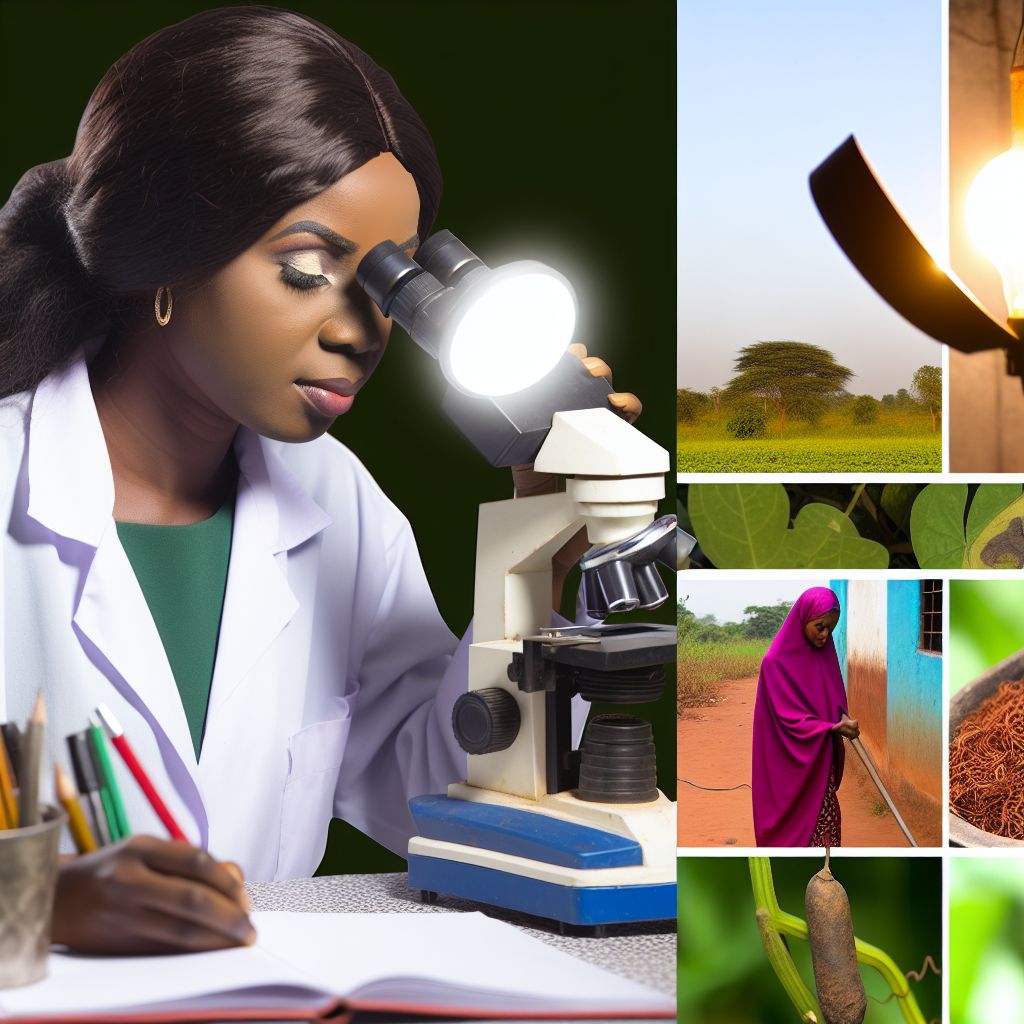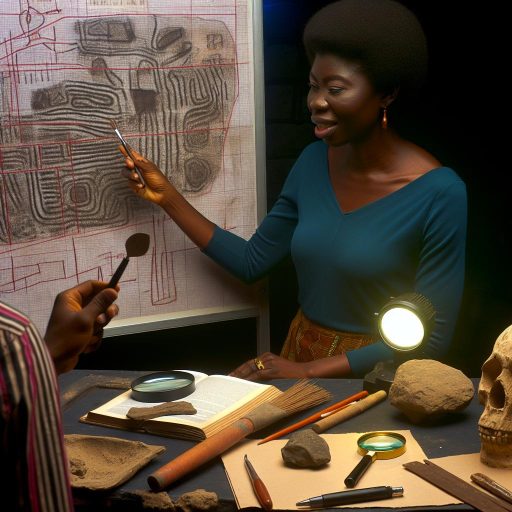Introduction:
Considering the role of agriculture in Nigeria’s economy, agri-science plays a crucial part in sustaining and improving the sector.
With the increasing interest in agri-science courses among Nigerian students, there are certain challenges that these students face.
High Demands:
One of the major challenges facing agri-science students in Nigeria is the high demands of the courses.
The curriculum is rigorous and requires dedication and hard work.
Lack of Resources:
Another challenge is the lack of resources such as modern laboratories, research facilities, and up-to-date technology.
This limitation hinders practical learning and research opportunities for students.
Outdated Curriculum:
Many agri-science programs in Nigeria follow an outdated curriculum that does not align with current industry practices.
This gap between theory and practice can be a hurdle for students.
Limited Opportunities:
Despite the growing interest in agri-science, there are limited job opportunities in the field.
This lack of prospects post-graduation can discourage students from pursuing these courses.
Perception and Stigma:
There is still a stigma associated with agriculture and agri-science in Nigeria, with many considering it a low-status profession.
This perception can deter students from pursuing these courses.
Financial Constraints:
Many students face financial constraints that hinder their ability to afford quality education in agri-science.
Scholarships and funding are limited, making it tough for students to pursue their passion.
Major Challenge Facing Agri-Science Students in Nigeria
One major challenge facing agri-science students in Nigeria is the lack of practical experience.
Limited Access to Agricultural Facilities and Equipment for Hands-On Learning
This limitation hinders students from gaining practical skills essential for their future careers.
Insufficient Practical Training Opportunities for Students to Apply Theoretical Knowledge
Without practical experiences, students may struggle to understand and retain the theoretical concepts taught in class.
Importance of Practical Experience in Agri-Science Education
Hands-on learning allows students to develop problem-solving skills, critical thinking, and confidence in their abilities.
One of the major challenges facing agri-science students in Nigeria is inadequate funding.
This issue has significant implications for the future of agriculture in the country.
Inadequate funding:
- Lack of investment in agricultural research and development
- Insufficient financial support for agri-science programs and projects
- Impact of funding constraints on students’ access to resources and opportunities
When there is a lack of investment in agricultural research and development, it hampers the progress and innovation in the sector.
This results in outdated practices being perpetuated, hindering the overall growth of agriculture in Nigeria.
Furthermore, the insufficient financial support for agri-science programs and projects means that students do not have access to necessary resources such as state-of-the-art laboratories, equipment, and technology.
This lack of resources limits their ability to conduct research and experiments effectively.
Moreover, the impact of funding constraints on students’ access to resources and opportunities is significant.
It limits their exposure to practical experiences and hands-on learning, which are crucial for their development as future agri-science professionals.
Inadequate funding is a critical challenge that needs to be addressed to support the growth and development of agri-science students in Nigeria.
By investing in agricultural research and providing financial support for programs and projects, the country can nurture a new generation of skilled professionals who can drive innovation and sustainability in the agricultural sector.
Discover More: Graduate Programs in Applied Biology in Nigeria
Challenges with Outdated Curriculum
Agri-science programs often have course content that is no longer relevant to modern agricultural practices.
Students may struggle to apply outdated knowledge to current industry standards and technologies.
There is a pressing need for curriculum revision to align with the latest advancements in the field of agriculture.
Need for Curriculum Revision
By updating the curriculum, students can be better prepared for careers in agriculture that require knowledge of current practices.
Curriculum revision ensures that students are equipped with the skills and information needed to succeed in the industry.
Bringing the curriculum up to date can help students stay competitive in a constantly evolving agricultural landscape.
Importance of a Dynamic Curriculum
A dynamic and industry-relevant curriculum is essential for the success of agri-science students in Nigeria.
Such a curriculum can provide students with the latest knowledge and skills that are in demand in the agricultural sector.
It can also help students adapt to changes in the industry and stay ahead of the curve in their careers.
Addressing the issue of outdated curriculum in agri-science programs is crucial for the success of students in Nigeria.
By revising the curriculum to align with modern agricultural practices and technologies, students can be better prepared for the challenges and opportunities in the field of agriculture.
Transform Your Career with Expert Guidance
Get personalized mentorship consulting that’s tailored to your unique path. Our expert advice is actionable and exclusive.
Get StartedLearn More: Career Opportunities in Animal Science in Nigeria
Challenges Facing Agri-Science Students in Nigeria
One of the major challenges facing agri-science students in Nigeria is limited employment opportunities.
Issues Related to Job Availability and Career Prospects
Agri-science graduates often struggle to find suitable employment upon completing their studies.
The agricultural sector in Nigeria faces various challenges that hinder job creation for these graduates.
Lack of Support for Internships and Job Placements
Many agri-science students in Nigeria lack access to internship opportunities and job placements.
These experiences could provide them with valuable hands-on knowledge.
Without practical training, it becomes difficult for these students to secure employment in the field after graduation.
Bridging the Gap Between Education and Industry
It is crucial for educational institutions and the agricultural industry to collaborate.
This collaboration can bridge the gap between theoretical knowledge and practical skills.
By incorporating industry-relevant training and internships into the curriculum, students can gain the necessary experience.
Such initiatives will help students succeed in the job market.
Delve into the Subject: Chemical Sciences Professional Associations in Nigeria

Inadequate infrastructure:
- Challenges with insufficient infrastructure and facilities in agri-science institutions.
- Students face obstacles in accessing necessary resources for practical learning.
- Lack of proper equipment hinders research efforts and hands-on experience.
Impact on students’ learning experience and research capabilities:
- Students struggle to perform experiments and apply theoretical knowledge.
- Lack of infrastructure limits the scope and depth of research projects.
- Overall educational quality suffers due to inadequate facilities.
Importance of infrastructure development to support quality education in agriculture:
- Modern equipment and facilities are essential for training the next generation of agri-scientists.
- Infrastructure upgrades can enhance practical skills and innovation among students.
- Improved facilities attract top talent and promote cutting-edge research in agriculture.
Investing in infrastructure is crucial for the growth and development of agri-science education in Nigeria.
Without adequate facilities, students are unable to fully engage in hands-on learning experiences, hindering their ability to apply theoretical knowledge in real-world settings.
This lack of infrastructure also limits the scope and depth of research projects that students can undertake, impeding their ability to contribute meaningfully to the field of agriculture.
Furthermore, inadequate infrastructure negatively impacts the overall quality of education in agri-science institutions.
Without access to modern equipment and facilities, students are unable to develop the practical skills and innovative thinking necessary for success in the field.
This lack of resources also makes it challenging for educators to deliver a comprehensive curriculum that prepares students for the demands of the industry.
Therefore, infrastructure development is crucial for supporting quality education in agriculture.
By investing in modern facilities, institutions can provide students with the tools they need to succeed in their studies and future careers.
Upgraded infrastructure can enhance the learning experience, promote hands-on learning, and foster a culture of innovation among students.
Moreover, improved facilities attract top talent to agri-science institutions, ensuring that the field remains competitive and relevant.
By providing students with access to cutting-edge equipment and resources, institutions can position themselves as leaders in agricultural research and education.
This, in turn, benefits not only students but also the broader agricultural community, as new ideas and technologies emerge from well-equipped institutions.
Addressing the challenge of inadequate infrastructure is essential for the growth and advancement of agri-science education in Nigeria.
By prioritizing infrastructure development, institutions can create an environment that fosters innovation, practical skills, and high-quality research.
Investing in modern facilities is an investment in the future of agriculture, ensuring that the field continues to thrive and evolve in the years to come.
You Might Also Like: Tips for Excelling in Applied Biology Studies
Cultural stereotypes and perceptions:
Negative attitudes towards agricultural professions in Nigerian society.
Stigmatization of agri-science students and careers.
Importance of changing societal perceptions to promote interest and investment in agriculture.
Negative attitudes towards agricultural professions in Nigerian society
Agricultural professions are often looked down upon in Nigerian society.
Many consider them inferior to other career paths.
This negative perception stems from a lack of understanding and appreciation for the importance of agriculture in the country’s economy and food security.
Stigmatization of agri-science students and careers
Students pursuing agri-science courses are often stigmatized and faced with prejudice.
They are sometimes seen as not being intelligent or capable of excelling in more prestigious fields.
This stigma can discourage young people from choosing careers in agriculture.
Importance of changing societal perceptions to promote interest and investment in agriculture
It is crucial to change societal perceptions surrounding agriculture.
This change encourages more students to pursue agri-science courses and careers.
By highlighting the significance of agriculture in feeding the nation and contributing to the economy, we can attract more interest and investment in this sector.
By debunking stereotypes and showcasing the potential for innovation and growth in agri-science, we can inspire a new generation of agricultural leaders.
Investing in agriculture is not just about feeding the population.
It is also about creating sustainable livelihoods and economic opportunities for the future.
As Agri-Science students in Nigeria, we face several challenges that hinder our academic and career growth.
One major challenge is the lack of modern agricultural equipment and technology for practical learning.
Additionally, inadequate funding for research projects and fieldwork limits our ability to explore innovative solutions.
Moreover, the outdated curriculum and teaching methods in some institutions do not meet the current needs of the industry.
Limited access to internship opportunities and hands-on training prevents us from gaining practical experience.
Furthermore, a lack of government support and investment in the agricultural sector contributes to the challenges we face.
It is crucial for the government, educational institutions, and stakeholders to address these issues promptly.
By providing better equipment, funding, and curriculum updates, we can better prepare Agri-Science students for success.
Internship programs and collaborations with industry professionals will also enhance our learning experience and skill development.
Supporting and empowering Agri-Science students is essential for the future of agriculture in Nigeria.
Let us work together to overcome these challenges and build a brighter future for our agricultural sector.
Additional Resources
#career #stemeducation #educationalleadership | Iyiola Oladunjoye …
Improving Food Safety Culture in Nigeria: A Review of Practical Issues




